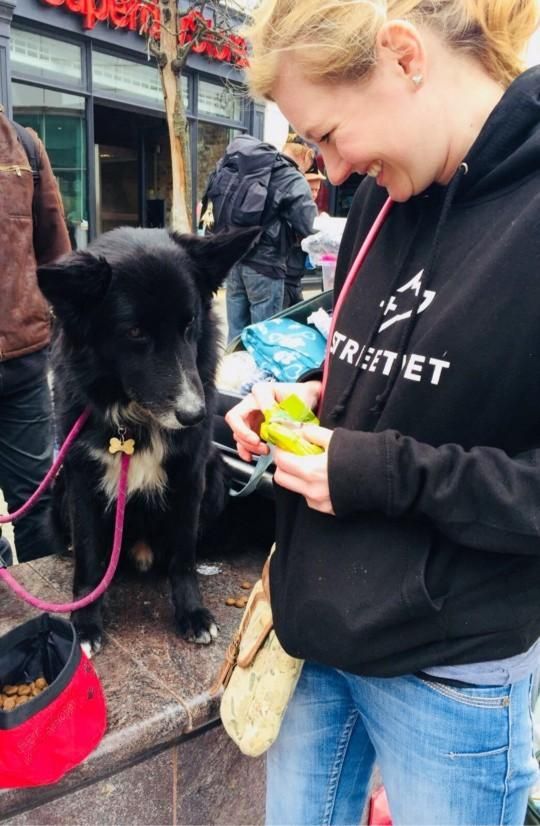StreetVet: The Crisis and The Cure
)
Why we should support the homeless who choose to keep their pets
It’s a bright cold day in April and the clock is striking one. At the foot of Brighton’s iconic clock tower a small table is being erected. Frenzied Sunday shoppers scurry past. Bleary-eyed party-goers stumble unknowingly through our make-shift consulting room. The soup is ready and the stethoscopes are out. This is StreetVet.

Almost immediately the bags are down, the owners and their dogs appear: strategically prompt for the acquisition of hot food, human necessities and to tend to the various niggles of their furry companions. And of course, they are companions so much more than they are pets. It surprises me how well cared for the dogs are, how nurturing the owners are and how willing they are to undertake the treatments that we suggest. New owners and their dogs approach with anxiety and trepidation. To them, this is a big deal. We offer food, treats, a smile and our time, well before we even start to get down to the nitty-gritty of veterinary medicine.
StreetVet is not a quick fix, but a small, critical part of a multimodal treatment approach to the homeless epidemic. We are privileged to be able to offer support from a very unique angle. We treat the acute issue, but more importantly, we can impact the wider situation: providing preventative healthcare and empowering owners to take control of their situation, educating hostels in safe and effective housing of people with pets, helping owners who have declined their own urgent medical care for fear of losing their pet, supporting those with assistance animals and providing an opening to a dialogue that may never have occurred had we not been there. The list goes on. Critics suggest that StreetVet is discriminatory in selecting who is more ‘worthy’ of receiving free veterinary treatment. This is not true. StreetVet is built on the recognition of homelessness as an unparalleled situation which most of us are lucky enough to observe at a very comfortable distance.

Sonny saunters over to our table with a radiant smile and rambunctious laughter. He shakes my hand, he jokes and then we talk. He challenges us to spend a night on the street. I make a mental shopping list of my needs: basic sanitation, water, warmth, dry clothing, food, privacy, my dog….. He talks emphatically of the bitter inner cold at 5am, but as a woman, I have a far bigger fear: the abrupt exposure to real vulnerability. In 2011, Crisis revealed the average life expectancy of a homeless person was 47; for women, it was just 43. It’s no wonder that people view their dogs as a necessity, but throw one into the mix and entering shops, community centres, housing facilities and doctor surgeries becomes an impossible task. Sonny points at the passing pedestrians and shakes his head, “They are all one paycheque away from being me”. I fear he is right.
Archie, a small rough-haired terrier-type is kicking up a vocal tornado, we offer to hold him so that his owner can eat and find a toothbrush. She trusts us implicitly. We are not here to judge people. Our simple premise is to reach out to those that are so destitute as to come to a soup kitchen in search of our help. And StreetVet does not stop at the hostel door but gives a helping hand over the threshold to a safer future for owner and pet. Of course, all systems will be abused and so our ethos is to treat on site wherever possible, particularly as compliance can be sketchy due to the chaotic nature of some people’s lifestyles.

The dogs draw the attention of the homeless community, they bring warmth, people come over to ask if they can pet and feed them. These dogs are an integral part of the homeless scene and are often recognised and greeted before their owners. They create a sense of identity and purpose. The general public stop to chat and suddenly the cloak of invisibility is lifted. We are approached by a smartly dressed, softly spoken lady and her two elderly dogs who she acquired some eight years before she was made homeless. She tells us how she, ironically, once ran a food bank for those in need. She describes her darker days and the lengths she went to to ensure her dogs would not be euthanased. Pets are natural anti-depressants and she is testament to this. She wants to talk and she wants her message to be heard: “…this can happen to anyone”.
We set about the task in hand. Wormers are given, microchips scanned, coats measured up and fitted, ears examined and medicated, anal glands expressed, castration wounds checked, worries listened to and concerns abated. People take very little from us; in most cases just enough to fill a pocket or to fit into a small bag. The crowds start to dwindle. Notes made, bags packed, we disperse into the Sunday shoppers.

Volunteering is a double edged sword. It is easy to come unstuck if you do not recognise that altruism is a selfish act when your own needs are prioritised over those of the people you aim to help. It is essential to embrace this concept and refer back to it as a constant gauge of your own motivations. So why did I join StreetVet? In part to give something back to my local community and more fundamentally to help those pets and their owners who may never make it through the doors of a veterinary practice through poverty, embarrassment, proximity, or sheer fear of how they will be treated by general society. But perhaps more selfishly to scratch that insidious irk, the quiet drone of those less fortunate than me, that plays like a moral metronome in an unignorable corner of my conscience. And to repay that homeless guy whose warm sausage sandwich my dog swiped that sunny July evening some years ago. Someone wise once said that charity begins at home. Well, these are our streets and this is our home. Together we are StreetVet.






)
)
)
)
)
)
)
)
)
)
)
)
)